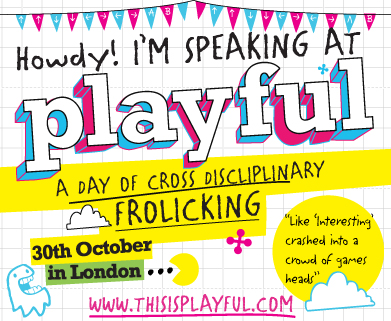Just a quick note to say that the good people at Playful asked me to speak at their one-day event all about games and play on Friday 30th October, at Conway Hall, London.
I don’t know much about games, so I’ll be talking about books. Surprise! But they will be playful games, or playful literatures, or playful ways of constructing literatures… or something.
UPDATE: due to a previous speaker on the same subject, I didn’t talk about books, but about AWESOMENESS, MAGIC, and a computer made out of matchboxes. You can read the full talk, with slides, at shorttermmemoryloss.com/menace/.

Sorry, I left this comment at another post, so I thought I’d duplicate it so you wouldn’t miss it.
I am a librarian at a university in the US. I am commenting on something on one of your posts way back on OCLC. You were looking for a way to search and link to your local libary catalogue. You gave a link to the catalogue and I looked at it, and somehow you think it is not adequate enough. I am not sure why. It looked adequate with all the standard search features. Actually using WorldCat would have been much more cumbersome to look for materials solely from your local library, and would have given you basically the same results — assuming all of your library’s resources are in the WorldCat — some of their more specialized items may not have been easily enough catalogued to put into WorldCat.
Where I live, we have access to virtually any library catalogue in our state: university, local etc. through a database constructed by our state government for state residents. The database also contains full text magazine and newspaper articles and government documents.
You say that you think data, and I guess that would include data about libraries’ holdings, should be “free.†Who exactly is going to pay to make such data “free†– which would include data entry, upload and maintanance? I don’t know if OCLC is making huge profits or not, but what they do costs money — no one would be able to do it for “free.†For example, our US Library of Congress, which employs thousands of people, receives approximately 10,000 more items than they can catalogue every single day. I think of this when I hear people say things like “every book in the world should be made electronic.â€
The main reason we use WorldCat at our library is to locate books we don’t own (there are other uses too). Then people can obtain them through Interlibrary Loan. It is a wonderful service, for the most part with no charge to the patron. Tell me how could this possibly be made “free�
By the way a limited amount of WorldCat entries are available through the internet, for free, at least in the US. Perhaps some kindly non-profit group could do what OCLC does, but they would still have to charge for their services. It could not be “free.â€
Comment by Sue — October 28, 2009 @ 2:08 am
Hello Sue –
I believe you’re referring to this post on the OCLC.
There are two major misconceptions here. Firstly, it’s not easy to properly find out what books are available from local library services. Yes, I can search each library catalogue manually and separately, but these libraries have inter-library lending agreements that are opaque from the web, and they’re not addressable programatically, via an API, so I can’t build services around them – which was the frustration in the earlier article.
Secondly, I want the data to be free to use because I’ve already paid for it, through taxation. My local library services have outsourced their data to a company that charges for access, and as a taxpayer, I think this is unacceptable.
“Kindly non-profits” are already doing this – such as the Internet Archive’s Open Library project – and they’re showing it can be done for free, as a public service.
Comment by James Bridle — October 28, 2009 @ 10:48 am